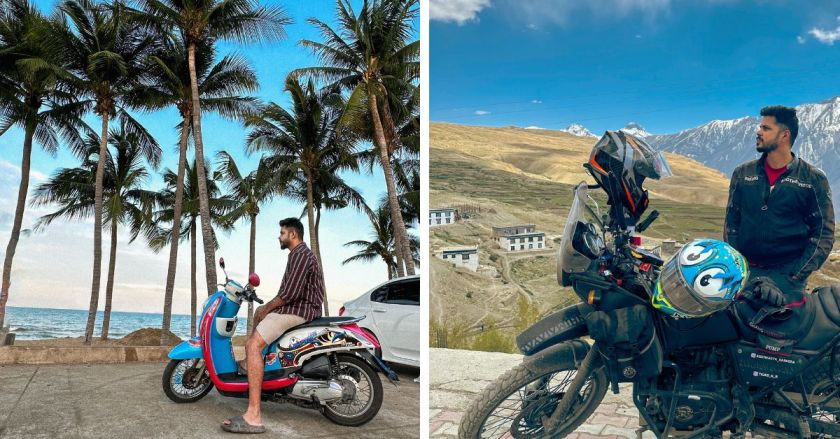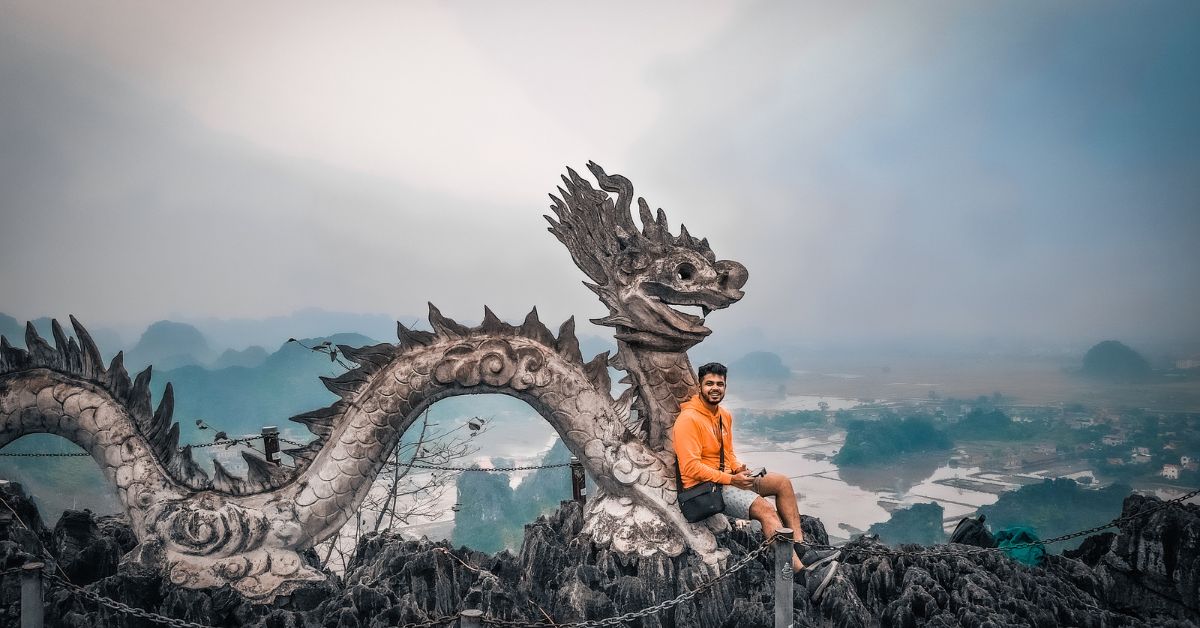For most of his life as a kid and a student, Tejas G R dreamt of becoming an IT professional.
“My dreams were simple; creating content and travelling was never a part of my life,” he emphasises.
But somewhere along the way while travelling between his home in Mangaluru and Bengaluru college on his bike, he found his calling.
“I loved being on the road and those experiences laid the foundation of my passion,” he shares in a conversation with The Better India.
Currently, balancing his full-time job as an engineer and a travel influencer with over 60,000 followers on Instagram, he has travelled over 497 cities along with his wife on his bike, covering 60,000 km on the road.
Travelling became my passion
Raised in Karnataka, Tejas shares how his love for biking and travelling began.
“It all started back in college when YouTube was new. I would watch a lot of travel videos and make small trips near my college with friends. That was the beginning of my many travels,” he shares.
“After college, I moved to Bengaluru and started working in the IT sector. My first job was with ITC, and that’s when I started travelling more seriously,” he says.
But, travel blogging was never a part of his plan.

“In college, I just wanted to become an IT professional. But then the COVID-19 pandemic hit, and we got to work from home. My girlfriend (now wife) and I started taking small trips around Managluru when the restrictions eased up,” he shares.
At the time, Tejas already had a YouTube channel where he did some moto-vlogging.
“During the COVID-19 pandemic, we decided to focus more on creating content, dedicating a couple of hours each day to filming and editing. It wasn’t a planned journey to becoming content creators; it just happened as we kept making videos and some of them went viral,” he says.
Talking about how he manages travelling with his full-time job, he says, “It’s very challenging, but we manage by prioritising travel over other activities. Both my wife and I have flexible jobs that allow us to work from anywhere. We have supportive managers, which makes it easier to get time-off when needed.”
He adds, “When we’re travelling, we wake up early, explore the place, and then start working around 11 am. We work until about 6pm, take small breaks in between, and then spend an hour or so editing videos at night. It’s all about prioritising travel and making the most of our time.”
The couple has travelled to most states in India.
“Our initial goal was to cover ten states in a year. Recently, we went from Mangaluru to Srinagar. We’ve covered almost all the central states, taking about a month to explore each,” he says.
He says, “We’ve covered most states except for five in the Northeast and the Western Ghats. Overall, we’ve covered nearly all the states on our bike except for a few regions.”
Things to keep in mind while travelling on a bike
1. Carry bike essentials:
“For long travels on the bike, I ensure that I carry all necessary spare parts and tools for emergencies. My bike is a mid-range model, so I have a kit handy with items I can use for basic repairs,” he says.
The kit includes a mini portable pump that works on batteries, spare tubes and tools to remove the tube, spark plugs, extra wire, tape, and fuses.
2. Be wild and free!
Following your instincts and exploring everything that comes your way is how Tejas likes to travel.
“We primarily use Google Maps for planning our routes. We choose a starting point and an endpoint, then look for significant landmarks or places of interest along the way. For instance, when travelling to Kashmir, we included stops at significant sites like the 23 Temples in Madhya Pradesh and the Grand Canyon of India in Rajasthan,” he says.
3. Save cost by budgeting:
Budgeting for long-distance bike trips involves major expenses like fuel, food, and accommodation.
“Fuel costs are fixed, but we save on food and accommodation. We’ve stayed in budget hotels for as low as ₹400, though this isn’t always suitable when travelling with my partner. We prefer booking Airbnb for safer and sometimes cheaper options,” he says.

“For food, we avoid high-end restaurants, opting for local eateries instead. We also carry bread and peanut butter for breakfasts and sometimes cook in Airbnbs which helps save on food expenses.”
4. Don’t push yourself, enjoy the journey!
Riding for long hours can be taxing but according to Tejas, it becomes easy with every trip.
“Physically, we don’t follow a strict fitness routine but occasionally hit the gym. Our bodies have adapted to long rides, making biking more comfortable than long car journeys. The connection with our bike has developed over time, making long-distance rides manageable,” he says.
5. Three Magic Words: Plan, Plan & Plan!
For anyone planning their first long-distance bike trip, thorough planning is essential.
“Start with shorter distances, covering 200-300 km per day, and gradually increase as you become more comfortable. Consider the road conditions and weather, especially in hilly areas. Investing in a riding class can be beneficial, teaching you how to handle various terrains and unexpected situations,” he says.
Book your accommodations ahead of time. “We book accommodations through platforms like MMT, Booking.com, and Airbnb, and sometimes collaborate with properties if they have approved for a partnership,” he says.
5. What not to do on long travels
Common mistakes new bike travellers make include underestimating the importance of preparation.
“For example, he says, during a trip from Mangaluru to Bengaluru, I had a puncture but no spare parts. Carrying essential spare parts is crucial. Another lesson was during our Ladakh trip, where we underestimated the altitude and suffered from severe altitude sickness. Proper research and preparation for such conditions are vital.”
Overall, balancing work and travel requires dedication, planning, and prioritising, but the experiences and memories make it all worthwhile, he says.
(Edited by Padmashree Pande; All Pictures Credit: Tejas)
No comments:
Post a Comment